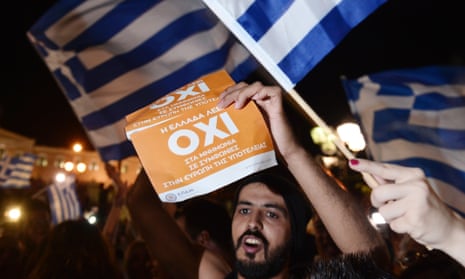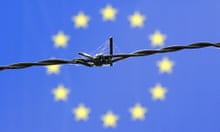As two cars roared past beeping their horns at the no vote win, Petros, 33, slapped his hand on his heart and smiled. “I’m just so relieved,” he grinned as he walked down a pavement that had been spray-painted with no slogans earlier in the week.
“We love Europe. It’s not that we hate Europe. We just wanted to tell Europe how much we’re suffering. And how everything seemed so totally unfair.” He paused. “But I do know it’s still going to be hard. Austerity is not over. We just want a second chance at a deal.”
A musician working in a high-school in Greece’s northern city of Thessaloniki, Petros had seen his salary slashed over the past five years. His girlfriend, with a background in logistics, has been unemployed for years now, occasionally managing to get jobs here and there in bars. His two brothers were jobless, as were most of his friends in a city facing around 65% youth unemployment, where around third of the adult population is out of work and even those in work often don’t get paid for months on end.
His father, a priest currently supporting all his adult children, kept nagging him to get married to his live-in girlfriend. “I have to keep telling him, ‘How can I get married, dad, with no money, unless you agree to subsidise me my whole life?’” He hadn’t voted for the radical left Syriza in January’s parliamentary elections, but voted no because he felt Greeks needed to object to the pain being heaped on ordinary citizens. He wasn’t worried about bank closures “because quite frankly I’ve got nothing in the bank”.
Among the no voters emerging from polling stations earlier in the afternoon, many had said their vote was about making human voices heard, trying to open Europe’s eyes to the reality of people bearing the brunt of austerity measures as a third of people live under the poverty line. Penny Chorafa, 38, who runs an architectural practice hit by the crisis, said she was pro-Europe and pro the euro, but voted no to allow Greece to reject a “bad deal” and renegotiate.
But if anyone had expected the referendum might mark that very Greek concept of catharsis – a cleansing and purging of the emotions – it was far from the case. Many, including no voters, were just as concerned with the future of the country as they had been before. A divisive campaign had muddied the waters, leaving people fearful and wary of the doomsday predictions of the media.
In a bar on a narrow side-street, two middle-aged customers nursed drinks outside, while Yiannis Georgoulis, 43, stood at the empty bar staring at the TV screen giving the referendum results. “Whether it was a no or a yes that won, it was always going to be difficult,” he said. “This isn’t the end of it, in fact it’s only the beginning. Either way, there’s not much hope round here and the crisis goes on.”
He’d been working for over 20 years in the restaurant trade, including for 11 years in a local US-themed restaurant which famously closed at the start of the crisis, leaving salaries unpaid. He was the only one in his family with a job, and was supporting his sister and niece. He owed €1,800 in electricity bills but managed to make a tiny contribution every once in a while to stop getting cut off. He was irate at what he called scare tactics in the media over capital controls, and unsure of what might happen next.
“There’s an old lady in my building who goes out every day to get out the daily bank limit of €60. She’s scared. There’s a fear factor which I really don’t like.”
Antonis Vakalis, 45, who runs two private schools in the city, said he had found the referendum question ridiculous but, like many of his friends in the private sector, had voted yes to show he was in favour of Greece staying in the euro and in the European Union. He felt the large win by the no camp showed up how the movement for the yes camp and for staying in Europe lacked credible figureheads and leaders.
He said he had despaired of seeing old political figures such as the right’s New Democracy leader, Antonis Samaras, appearing for the yes camp. “People are tired and distrustful of the old political class. In the yes camp, there’s a feeling that we badly need new and different faces.”
In Athens, Despina Kouladouros was furious. “Yes, I did vote,” said the interior designer, jabbing a fork into the dish that had just been brought to her pavement café table. “And I voted yes. But why? I didn’t want to vote. Why did the government ask me to vote? Do your job. Go and negotiate. Why pass the choice to me?”
“Because Tsipras doesn’t want to take the responsibility on to his own shoulders,” put in her friend Chrysanthi Papayianni. “He has no experience. He’s been a politician all his life, a communist. But he comes from a rich family. He doesn’t really know about the people.”
“It’s awful. Awful,” she said looking up at the television screen flashing up results showing the no vote well ahead. “The banks will be closed for four months at least. We’ll go to the [old] currency. One euro will be worth 1,000 drachmas. So we’ll be 60% poorer.”
Papayianni, a financial controller with a shipping company, thought it certain there would be a 30% “haircut” on deposits, as reported at the end of last week, and that a shift back to the drachma would involve a devaluation of another 30%.
“The government doesn’t realise that they’re still going to have to pay back the loans,” snorted Kouladouros, who said she had had to close her shop because of Greece’s five-year financial crisis. “[Creditors] want their money.”
Papayianni said she feared her employers would decide to close their business in Greece. “I’m 29 years old and I’m thinking about my future.”
Lorena Mexi, also a university graduate in her 20s, said she too had been thinking about her future when she went to vote yesterday, but had come to a quite different conclusion. “I voted no,” she said. “I have a degree in political science. And I’m a waitress. I have two jobs. I work up to 10 hours a day and up to six days a week for €700 a month – and that’s with tips.
“The basic wage is €300. And I have to find €200 just for my rent. If I had voted yes I would have been saying it was OK for my salary to be €300 a month for the rest of my life. It’s really all about money. And I have nothing to lose.”
Did she not fear that a no vote could lead to Greece being driven out of the eurozone, or even the EU? “No,” she said. “Greece is part of the eurozone.”
George Satiris did not have much to lose either. He used to be a foreman in a factory. Now he is unemployed. “I voted no because what’s happening to Greece is unfair. It’s been unfair for years.”
Did he think a no could spell Grexit? “Yes. Maybe. Perhaps,” he said calmly. “But if Greece leaves the euro then she will save her children.”
Sitting on the step outside the school that her two daughters attend, Aristea Dedes was angry. Workers in Pyles, a village surrounded by sun-bleached farmland in central Greece, were on their lunch break and the 42-year-old was still trying to decide how to vote.
“I’m supposed to vote on a draft agreement that no longer exists,” she said. “Everyone sees something different in this referendum, it should never have happened.”
Elias Stamatis, 70, was typical of the Greeks whose politics have lost their leaning either to the right or left but remained grounded in a deep and angry nationalism.
“The Greeks have been betrayed so many times in history,” he said as he reeled off a list of the traitors, from Britain and Germany to Albania and Turkey. Pyles and the surrounding villages, known as Dervenohoria, had twice the national level of support for the neo-Nazi Golden Dawn in January’s general election. But in the black and white world of a referendum they now find themselves on the same side as Syriza, the country’s ruling leftwing party.
The retired farmer said that his lifelong attachment to the right wing had withered since January and that he had come to regard Greece’s radical leader Alexis Tsipras as “the greatest prime minister that Greece has ever had”.
Like so many Greek voters, Stamatis thought that the foreign warnings of bankruptcy and a return to the drachma were hollow threats. He said the former student radical turned premier would return to Brussels on Monday with a new mandate and “this time it will be Tsipras who has the whip hand”.
An hour’s drive away, the small city of Chalkida harboured similar anger. Seated in front of the entrance to the main polling station, Athina Vlahogiorgiou sported a no badge to go with the two no flyers taped to her desk. An unemployed mother-of-two and a staunch supporter of Syriza she said that momentum was firmly with the no voters. “In the last five years more than 10,000 Greeks have committed suicide; our children have become immigrants; what do we have left to lose?”
Her son had just turned 21, she said, but she had not been with him to celebrate. He had left for London where he had found work in the kitchen of a fast food chain restaurant. “He couldn’t even get a job like that in Greece.”
The shipyards in Chalkida have largely gone the way of the cement works, making it a hotbed of support for the Marxist wing of Syriza, who want to cast the austerity programme demanded by international creditors in return for financial aid as an act of class war.
“Whomever wants to ignore what has been done to us has something wrong in their head,” Vlahogiorgiou said in disgust. “They are spitting in the face of the Greek people.”







Comments (…)
Sign in or create your Guardian account to join the discussion